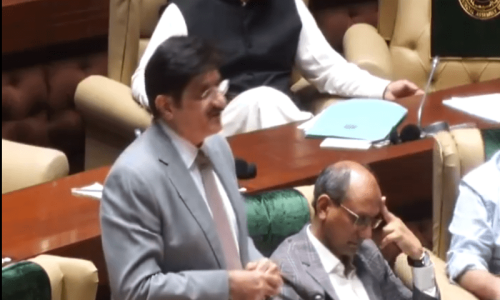
KARACHI: A one-day conference titled Ghalib –– Adabi Aur Fikri Jihaat organised by the Urdu Department of University of Karachi in connection with poet Mirza Asadullah Khan Ghalib’s 150th death anniversary had a thought-provoking inaugural session.
Dr Khalid Nadim of Sargodha University delivered the keynote speech on Ghalib’s life. He said if one ghazal could encapsulate the poet’s life, it would be:
Hazaron khwahishein aisi ke her khwahish pe dumm nikle
Buhat nikle merey armaan lekin phir bhi kam nikle
[I have thousands of unfulfilled dreams that could take my life Despite the big number, it doesn’t seem enough]
Dr Nadim argued that a lot has been said and written about Ghalib’s poetry but not much has been discussed about the kind of hardships that he faced in his life, and the way he tackled them. His difficulties were twofold: one, his personal predicaments that’s to do with the death of his father and uncle when he was very young, a mentally challenged younger brother, and a property issue that kept him busy for the rest of his life because of which he had to borrow money on a regular basis; two, the British rule over India which made Muslims face defeat (for as long the British held sway over the region.) Despite all these odds, Ghalib kept writing poetry and prose, and the most striking part of his creative pursuits was that they never lost sight of wit and humour (shaguftagi).
KU hosts conference to mark Ghalib’s 150th death anniversary
Journalist Mahmood Shaam was the chief guest on the occasion. He read out an intellectually stimulating paper, beginning by pointing out that Ghalib is thought to be the poet of every century (read: era). He remarked it may have to do with the idea that all centuries have gathered at a single place and become stationary. Or it may have to do with the fact that Ghalib’s poetry contains such a powerful world of possibility that his verses change their meaning according to the era they’re being read in. Although Ghalib, Momin and Iqbal come along with you (students) from childhood, but his [Shaam’s] introduction to Ghalib happened when he as a young man sought the autograph of the principal of Oriental College, Dr Syed Abdullah. Dr Abdullah wrote the following verse by Ghalib in the autograph book:
Larazta hai mera dil zahmat-i-mehr-i-darakhshan per
Main hun woh qatra-i-shabnam ke ho khaar-i-bayaban per
[Fear engulfs my heart when I sense the inconvenience of the burning sun I’m like a dewdrop on the tip of a thorn in wilderness]
Mr Shaam said this kind of recondite poetry got his attention. Ghalib’s flight of the imagination, his keen observation, his idea of the solar system and the way he linked the firmament and earth were the subjects that the two lines skilfully touched upon. The poet wrote about many such things that have to do with the possibilities that exist in time and space.
Mr Shaam said since he was studying philosophy as a young man, he would seek absolute reality in things. Ghalib did that for him. His poetry has a mystic experience as well as a complete poetic system. This is the reason that he [Shaam] always wanted to research the metaphysical aspect in Ghalib’s verses but his journalistic work kept him busy. Unlike Iqbal (who penned The Reconstruction of Religious Thought in Islam), Ghalib didn’t leave his readers with anything where he could give them a clue to where his ideas came from –– he’s left it to the readers to find that out. Every couplet and verse of Ghalib has a separate message for each reader.
Mr Shaam said writing about metaphysics is fighting your own self. It can give you answers to certain questions, but that doesn’t mean that those answers will satisfy the questioner’s inquisitive mind. The path to absolute reality passes through doubt. Ghalib says:
Na gul-i-naghma hun na parda-i-saaz
Main hun apni shikast ki awaaz
[I’m neither a mellifluous melody nor the sound of musical instrument I’m the sound of my own defeat, my own broken self]
Vice Chancellor of Karachi University Prof Dr M. Ajmal Khan presided over the session. He said he doesn’t have much to do with poetry. It was in 1974 that he got to read shaeri for the first time. Ghalib, he claimed, is a distinctive poet because he comes across as relevant [to our times].
Earlier, chairperson of Urdu Department Prof Dr Tanzeemul Firdaus welcomed the guests.
Apart from research-based sessions at the conference, a mushaira was also lined up for the audience.
Published in Dawn, February 19th, 2019














































Dear visitor, the comments section is undergoing an overhaul and will return soon.